Lifestyle
STA, 26 March 2021 - The country-wide curfew is imposed from 10pm to 5am from Friday after the government decided to shorten it in light of the coming Daylight Saving Time change. Entering into force today are also inter-regional travel restrictions in red-coded regions. A negative rapid test result is no longer valid to enter Slovenia.
Only a negative PCR test result will be accepted from today to avoid quarantine on entering Slovenia. Meanwhile, dual owners and lessees of land in bordering areas will no longer need a negative test every seven days to cross the border.
The coastal Obalno-Kraška, western Goriška and northern Koroška regions have been demoted to tier red due to a deterioration of the epidemiological status there.
According to Wednesday's government decree, there is a number of exemptions from the ban on movement into and out of the three regions, including travel for work purposes. Students who commute from the red-coded regions to other regions for educational purposes are also such an exception even though the decree does not mention them specifically.
Bars and restaurants in regions with best epidemiological status are still allowed to serve customers outdoors.
Rallies or events of up to ten persons are permitted across the country. Outdoor religious services are meanwhile capped at one person per 10 square metres or more in the case of members of the same household.
STA, 24 March 2021 - Primary schools have been told by the Education Ministry to prepare for a hybrid model of classes involving alternative weeks for some pupils, should the coronavirus situation worsen.
The model, dubbed C1, foresees for classes to continue in-person for years one to five, while the rest of primary pupils would be in school every other week alternating with remote learning.
According to the online edition of the newspaper Večer, year eight to nine pupils would be in school the first week and year six to seven the next.
In a circular sent to schools, the ministry said the guidance did not mean yet that the C1 model would be in fact applied, but it was just to inform them of the potential scenario should the situation worsen.
The government is conducting its weekly review of coronavirus measures today amid expectations it could tighten restrictions as coronavirus transmissions have been increasing fast in recent days.
Year one to three primary pupils returned to school in mid-February, followed by other pupils. Secondary school pupils from year one to three have had alternative weeks classes for the third week now, after they had remote classes only since mid-October.
STA, 24 March 2020 - The national coordinator of vaccination logistics, Jelko Kacin, says it is realistic to expect that 70% of Slovenia's population, or all adult residents, would be vaccinated by the summer, as the country expects to receive more than 250,000 doses of the Johnson & Johnson vaccine by the end of June.
Kacin told the press on Wednesday that the country has been assured it would receive the first delivery of the single-dose Johnson & Johnson vaccine towards the end of April.
"The government will do everything to provide for the necessary quantities for the entire adult population," said Kacin.
Slovenia has so far ordered seven million doses of various vaccines against Covid, because another round of vaccination will probably be needed in the autumn, when vaccines against new strains of the coronavirus will probably be required, he said.
Residents older than 75 years will have been vaccinated by the end of the week, with those over 70 to follow next week, he announced.
Since the age limit on the AstraZeneca vaccine will be lifted, it will be also used for older residents.
The government will discuss changes to the national vaccination strategy later in the day to prioritise the group of people over 60 and then over 50, he announced.
He said Slovenia should have enough vaccine at the start of April to also start vaccinating those over 50.
He noted however the strategy could only be put in practice if enough doses are supplied, highlighting the AstraZeneca vaccine as the most problematic in this respect.
STA, 24 March 2021 - New coronavirus cases continue to rise at double-digit rates as 1,288 cases were confirmed on Tuesday, an almost two-month high, the latest government data show. Nine Covid-19 patients died.
Nearly 7,000 PCR tests were performed and 18.5% came back positive, a share that has remained broadly flat. Almost 28,000 rapid tests were performed as well.
There were 500 Covid-19 patients in hospital, down seven on the day before, while the number of ICU cases rose by three to 99, a one-month high.
The rolling seven-day average of new daily cases rose from 829 to 855, the government announced on Twitter.
The cumulative 14-day incidence per 100,000 residents rose to 531 and the 7-day to 285, show data released by the National Institute of Public Health (NIJZ).
Slovenia has so far confirmed 208,589 cases, according to the NIJZ.
The country remains in the orange tier of restrictions, but the situation is deteriorating, the government's Covid-19 spokeswoman Maja Bratuša told the daily press briefing.
The government will conduct its weekly review of restrictions in the evening after it has consulted the group of medical experts who advise the Health Ministry.
Get the latest data on coronavirus and Slovenia
Cook Eat Slovenia is one of the most successful books on Slovenian cooking aimed at an English-speaking audience, a collection of seasonal recipes that’s a clear and beautifully produced guide to potica, štruklji, gibanica, žlikrofi, kremšnita, mlinci and many more classics of the local table.

As we noted in our review when it was launched in 2019, back when eating out was possible, “the book takes you on a tour of all four seasons and Slovenia’s 24 culinary regions, and with more than 100 dishes over 200+ pages you’re certain to find plenty of old favourites along with some you’ve never heard of. Each recipe is presented alongside a picture of the dish itself – providing inspiration as well as some serving suggestions – and thus the book also works a practical guide to Slovenian cuisine, one that outside the kitchen you can use to spot dishes in the wild and expand the range of items you order from the menu or the market, providing a checklist of things to seek out.”
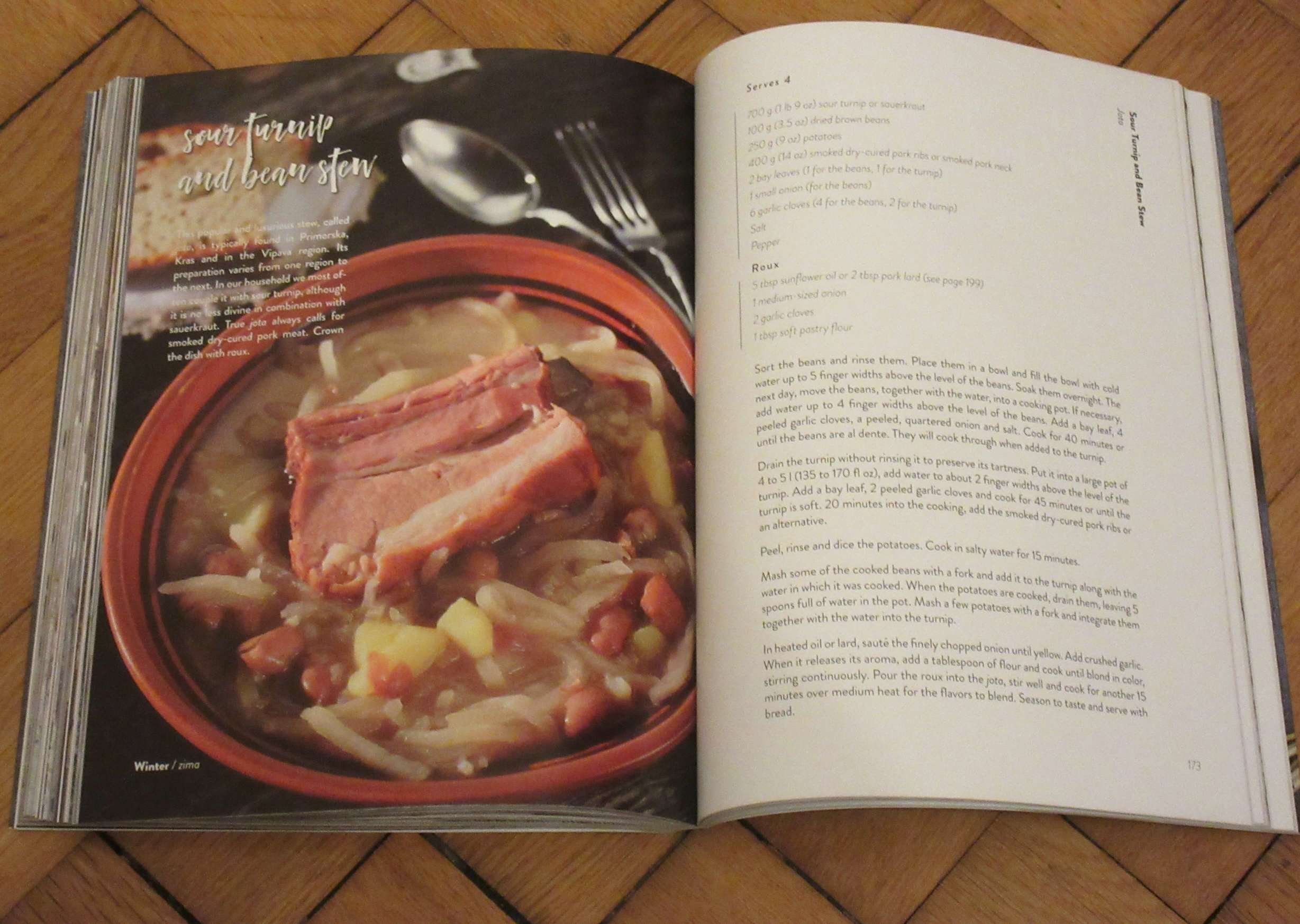
It's a well-written, well-made book. Photo: Mateja Jordović Potočnik
It's a great book, still available in stores and online, and while in happier days the author – Špela Vodovc – also offers in-person cooking classes and culinary tours, that side of her work has obviously been on hold along with the rest of the travel and tourism industry in Slovenia. Until now, that is, as Špela is coming back with a one-off opportunity to learn how to all make your Easter brighter and more Slovenian.
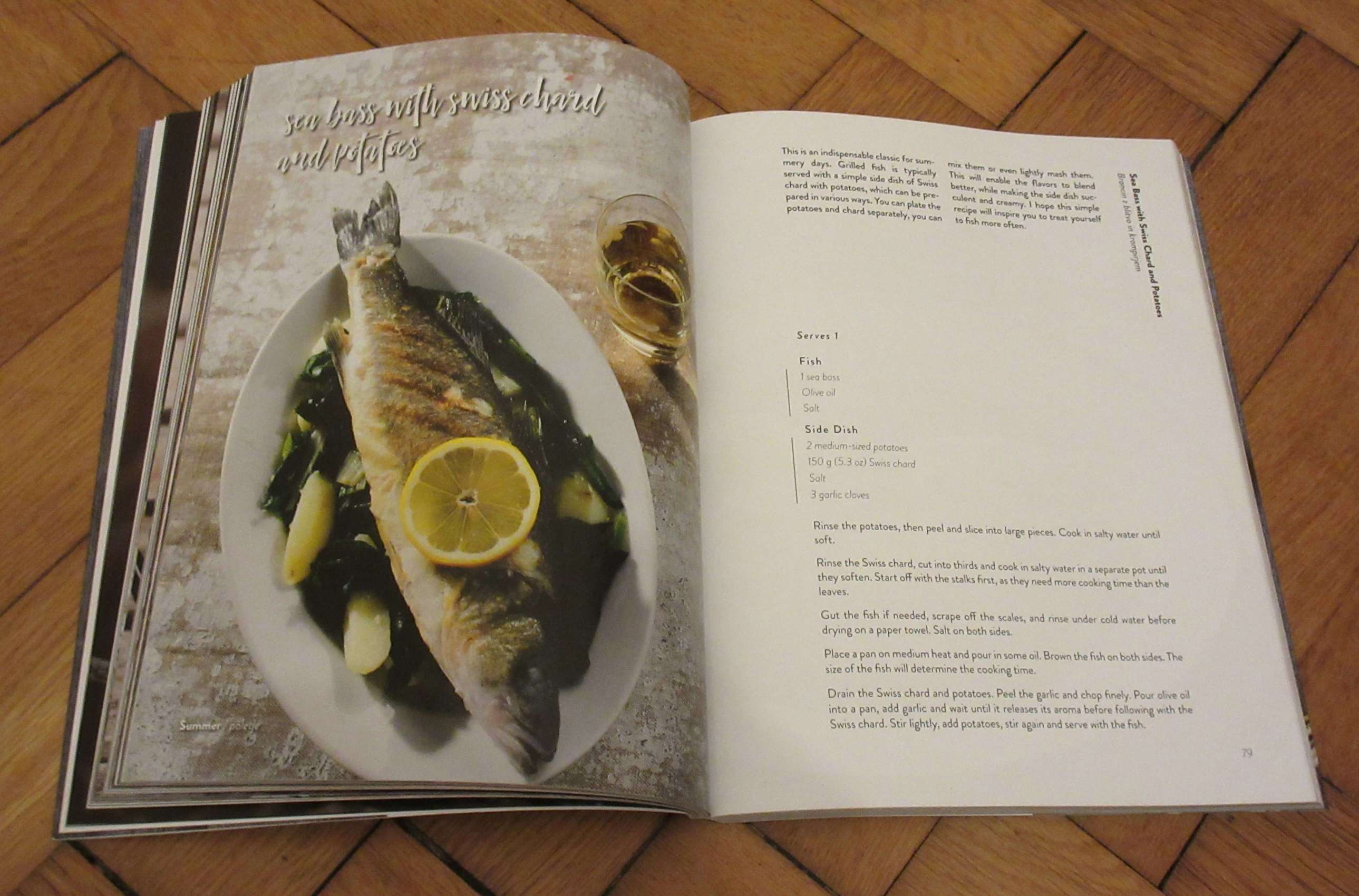
Photo: Mateja Jordović Potočnik
This year Easter Sunday is on 4 April, and you can prepare for the big day by taking a live, online video class in English with Špela and learn how to make Potica and decorate eggs using natural dye. The class will be hosted on YouTube, thus avoiding the awkwardness of Zoom calls and letting you relax, watch and cook alone, no matter what your wearing or how much you swear as you cook.
The class will take place on Friday 2 April from 17:00 to 20:00, and all you need to do is make sure you have access to a kitchen, a screen with internet access and the ingredients listed at the end of this story. Registration is required, and costs €35 per person, and can be done by clicking on the event under the calendar here.

Look for this
If you can’t make it, then do check out the book and some of the recipes it contains, such as Tarragon Potica, Easter Breakfast - Velikonočni Zajtrk, Three Kinds of Slovenian Easter Eggs and Potato and Pasta, or Grenadirmarš. If you can make the class, then don’t forget to register and make sure you have the following ingredients ready for 17:00 Friday, 2 April 2021.
Prepare and measure ingredients in advance
Place the eggs and yeast at room temperature at least half an hour before baking.
- a) Walnut Potica:
- Dough
600 g (4 ¼ cups or 21 oz) soft pastry flour
42 g (1.5 oz) fresh yeast or 14 g (0.5 oz) dry yeast
100 g (½ cup or 3.5 oz) sugar
5 g (0.2 oz) salt
1 tbsp rum
300 ml (1 ¼ cups or 10 fl oz) lukewarm milk
8 g (0.3 oz) vanilla sugar
50 g (1.8 oz) butter
4 egg yolks
½ lemon, zested - Filling
300 g (11 oz) shelled and grinded walnuts
200 ml (¾ cup or 7 fl oz) milk
100 g (3.5 oz) butter
10 g (0.4 oz) vanilla sugar
120 g (5/8 cup or 4 oz) sugar
2 tbsp rum
½ lemon, zested
1 egg white and 15 g (0.5 oz) sugar for whipped egg white - You will also need
Potičnik 27 cm (10 inches) across, you can also use 2 oblong baking pan with tall sides, 25x12x7 cm (9.8x4.7x2.7 inches)
Plastic bowl with cover, instead of cover you can also use plastic wrap
Wire sieve
Rolling pin
Hand electric mixer
Pastry cloth for rolling the dough
Soft pastry flour to facilitate the dough rolling process
Butter for buttering the mould/potičnik or oblong baking pan with tall sides
Caster sugar and a thin wooden stick
- b) Easter eggs
- Ingredients
15 eggs
Dry skin of red and brown onions
3 tbsp vinegar
5 rose hip teabags
A few pinches of salt
Different types of grass, leaves and flowers
Thread
Stockings, cut in 10x10 cm (4x4 inches) squares
You will also need
2 medium-size cooking pots
Sizers
STA, 22 March 2021 - Nation-wide exams for primary school children in years six and nine were cancelled last year due to coronavirus, but they are planned to be held as usual this year. The exam is taken with a pen and paper, and it will be no different this year. But to test the option of taking it online, a special pilot project is being launched today.
From Monday to Friday, more than 40,000 pupils in forms six and nine at 441 primary schools will be taking the exam online - on a computer or a tablet - to get the ropes.
Every school has been assigned the day and several slots to carry out the e-trail exam, with the majority of kids to take it in a computer classroom at their school.
Up to 5,000 pupils will be sitting for the exam simultaneously, for which reason schools have been divided into two approximately equally large groups.
The pilot project is designed to test how the network works if used by several thousand pupils at the same time and which problems may emerge, Darko Zupanc, the director of the National Examinations Centre, said on Friday.
This should allow education authorities to see whether it would be possible for the exam to be simultaneously taken at all primary schools, or also at home.
Kids will be able to use various online tools to do the assignments, while they will have a chance to retake the exam on their home computer later on the same day.
The electronic exam will not be graded because it is not meant to test knowledge, so children will get no test results.
At the end of the exam, they will have to answer several questions on their examination experience.
Zupanc said the data obtained from this pilot project should facilitate development of systemic tools for exams and grading with new technologies, especially in case of distance learning.
The national exams for primary schools were introduced 20 years ago and were last year cancelled for the first time.
However, they are not compulsory and have no bearing on the pupils' final grades, but there is also an idea to introduce them for children in third form.
The exams are not meant for schools to compare how well their pupils are doing in comparison with other schools, but for individual schools to evaluate their own work, the head of the national commission for the nation-wide exams in primaries, Janez Vogrinc, said on Friday.
The exam is taken in three stages; children in year six will this year take it in their mother tongue on 4 May, maths on 6 May and the foreign language on 10 May.
But Slovenian Headteachers' Association president Gregor Pečan believes that in the given situation, the national exams for primaries should not be held this year at all.
A month and a half after primaries reopened following a four-month closure, gaps in knowledge are starting to emerge, he said at today's government Covid briefing.
Pečan also recalled that the exams had been cancelled last year while pupils had been distance learning only for approximately two months.
"The majority of headteachers and other educators maintain that what is needed more is peace and support to rectify the situation as soon as possible."
Although admitting not everything was as gloomy as some see it when speaking of "a lost generation", he said "very good planning will be needed to restore the situation this year and in coming school years to get the generations to the level we want".
For the same reason the headteachers are against organising various competitions for primary school children, urging "immediate suspension" of competition activities, which he said were now fully underway.
Pečan also touched on today's launch of testing whether national exams could be taken online, saying the information he had showed there were many problems.
Not all browsers support the program, while its performance varies depending on device type.
STA, 19 March 2021 - University professors, teachers, municipal officials and journalists have gained the most trust of the public during the Covid-19 epidemic in Slovenia, while police officers have lost the most public trust, shows a survey by the pollster Valicon.
The survey, carried out between 26 February and 5 March on a sample of 1,032 adults, is part of the ongoing Mirror of Slovenia series that was launched in December 2012.
Valicon said on Friday as it presented the poll that the rate of trust in small Slovenian companies was up by 11 points compared to the previous measurement to 63 points to solidify them on the top of the list for organisations.
The "company or organisation in which you work" remains second on the list (44), after recording an eight-point growth, and education is third, followed by shops and retailers and large Slovenian companies.
The list of organisations with a positive rate of trust concludes with healthcare, military and police, with healthcare and police having lost some of the public trust since June 2020 - the former three and the latter six points.
Compared to November 2019, healthcare has actually gained 19 points, while the negative trend for the police continues, as their rate is down by 12 points. The rate is at 14 points, compared to the highest measured rate of 33 in 2014.
The key institutions of the executive and legislative branches of power and the Catholic Church are at the bottom of the list. The National Assembly is last with the rate of -60, which is actually a 5-point growth compared to the previous poll.
Government coalition parties have a rate of -58 (a 2-point growth) and the government a rate of -57 (a 3-point drop), and the list of institutions with a rate of below -50 concludes with the Catholic Church (-54).
The most trustworthy profession is still that of a firefighter, followed by nurses and scientists, while doctors, (small) entrepreneurs and teachers also enjoy the trust rate of above 50.
At the bottom of the list are "politicians in general", who trail government ministers, state officials, priests and company directors.
The selection of the winning entry concluded the 13th international Plaktivat competition, which this year was centred on the social concept of solidarity. A total of 336 submissions were entered in the competition, of which 176 arrived from abroad and 160 from Slovenia. The final submissions came from 28 different countries.
The expert panel – consisting of Sašo Petek (Agencija 101), Katja Petrin Dornik (Grey), Vasja Grabner (AV studio), Domen Husu (Yin Young), Martina Kokovnik Hakl, Luka Bajs (Grey), Tomaž Drozg (TAM-TAM) – was most convinced by the creative solution “Snežak” – “Snowman” by Peter Zabret, Rok Flego, and Lenart Slabe of the Pristop agency, as seen at the top of this story.
Related: Proglas – Where Slovenia’s Advertising Creatives Are Free To Shine
Sašo Petek, creative director at Agencija 101 and chairman of the panel described the chosen entry as follows: “The winning poster fits all the criteria of a good poster and simultaneously succeeds in presenting the complex theme of solidarity in an original, simple, and warm way. Its playfulness speaks to all generations and inspires solidarity in all of us.”
This time, the TAM-TAM Institute’s Plaktivat aims were to stimulate and strengthen solidarity in society, open a discussion on the fundaments of the values of solidarity, and reflect on the role of solidarity in forming a better society in our future.
In recent years Plaktivat competitions have been receiving an increasing number of student entries, which is why the organisers decided that this year would be the first to include a student category. In total 117 works were entered by students, with the winner being chosen by Nejc Trampuž, Alja Herlah, Blaž Rat, Alja Horvat in Nejc Prah. The lucky entrant in the student category is Tina Nunar (Academy of Figurative Arts, Univesity of Ljubljana), with the poster seen below.
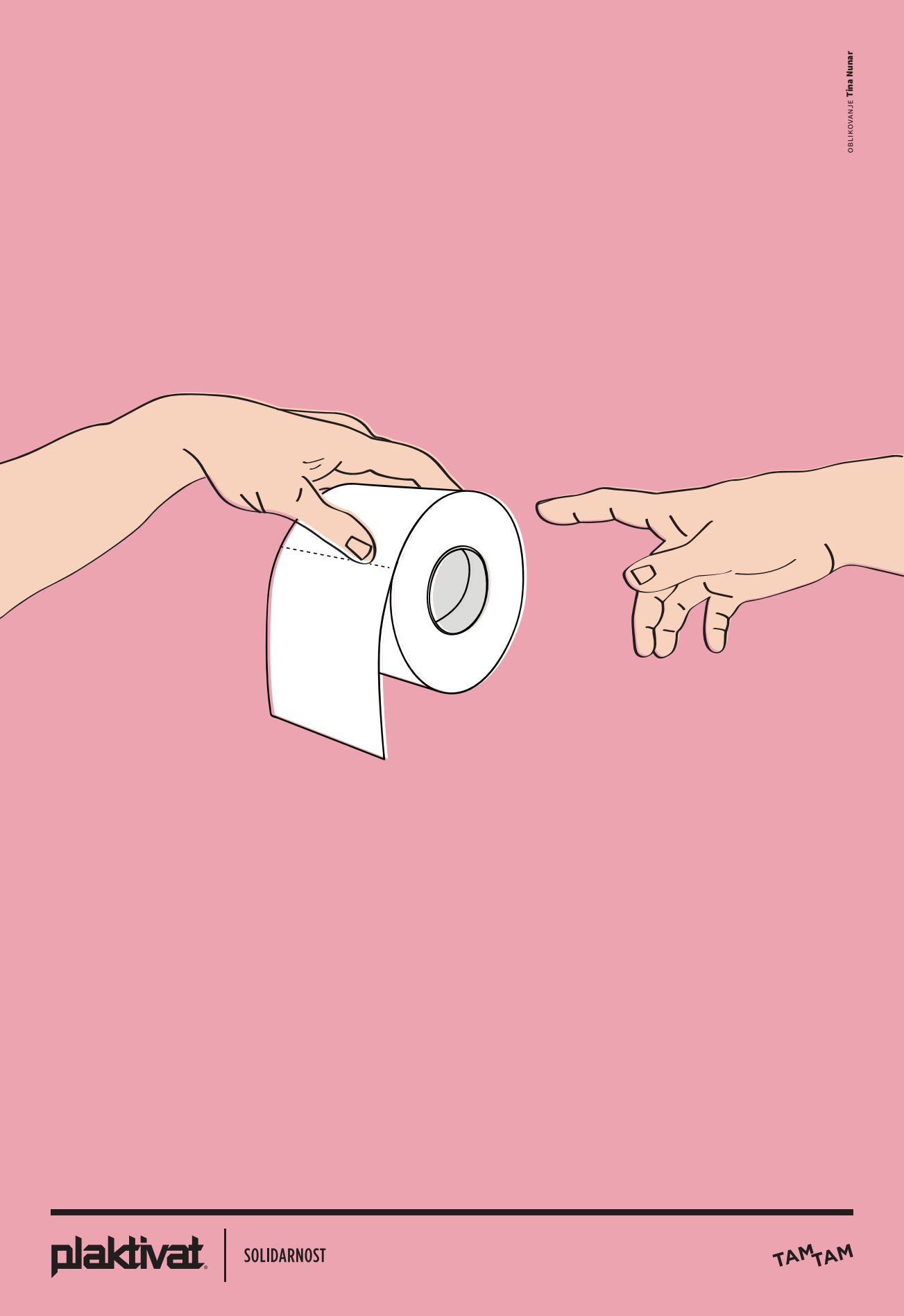
Design: Tina Nunar
The posters promoting solidarity are already on the streets and can perhaps be seen in a neighbourhood near you as they’re appear on 500 TAM-TAM poster locations across Slovenia. If not, don’t worry – you can seem below.
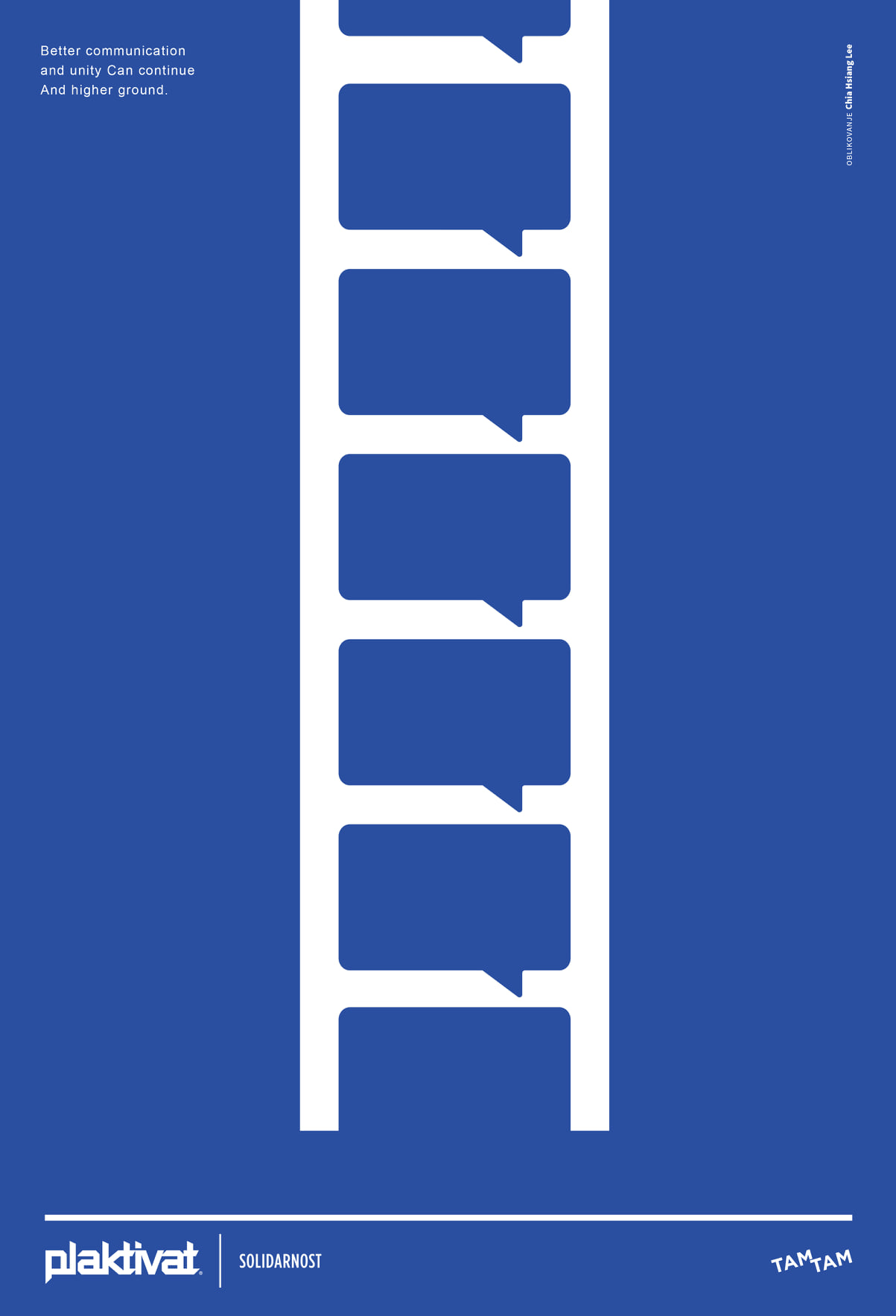
Design: Chia Hsiang Lee, Taiwan
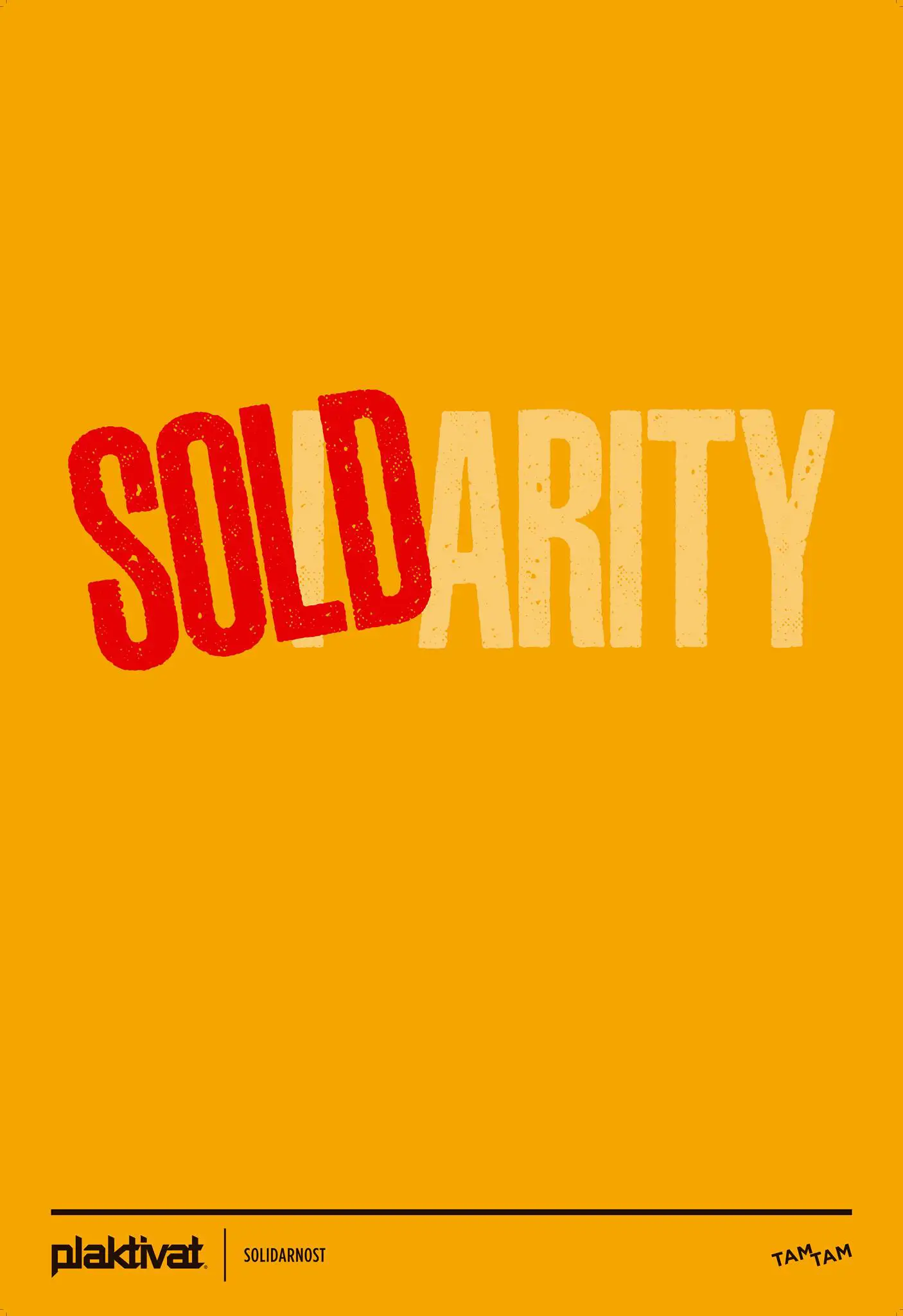
Design: Zlatan Dryanov, Bulgaria
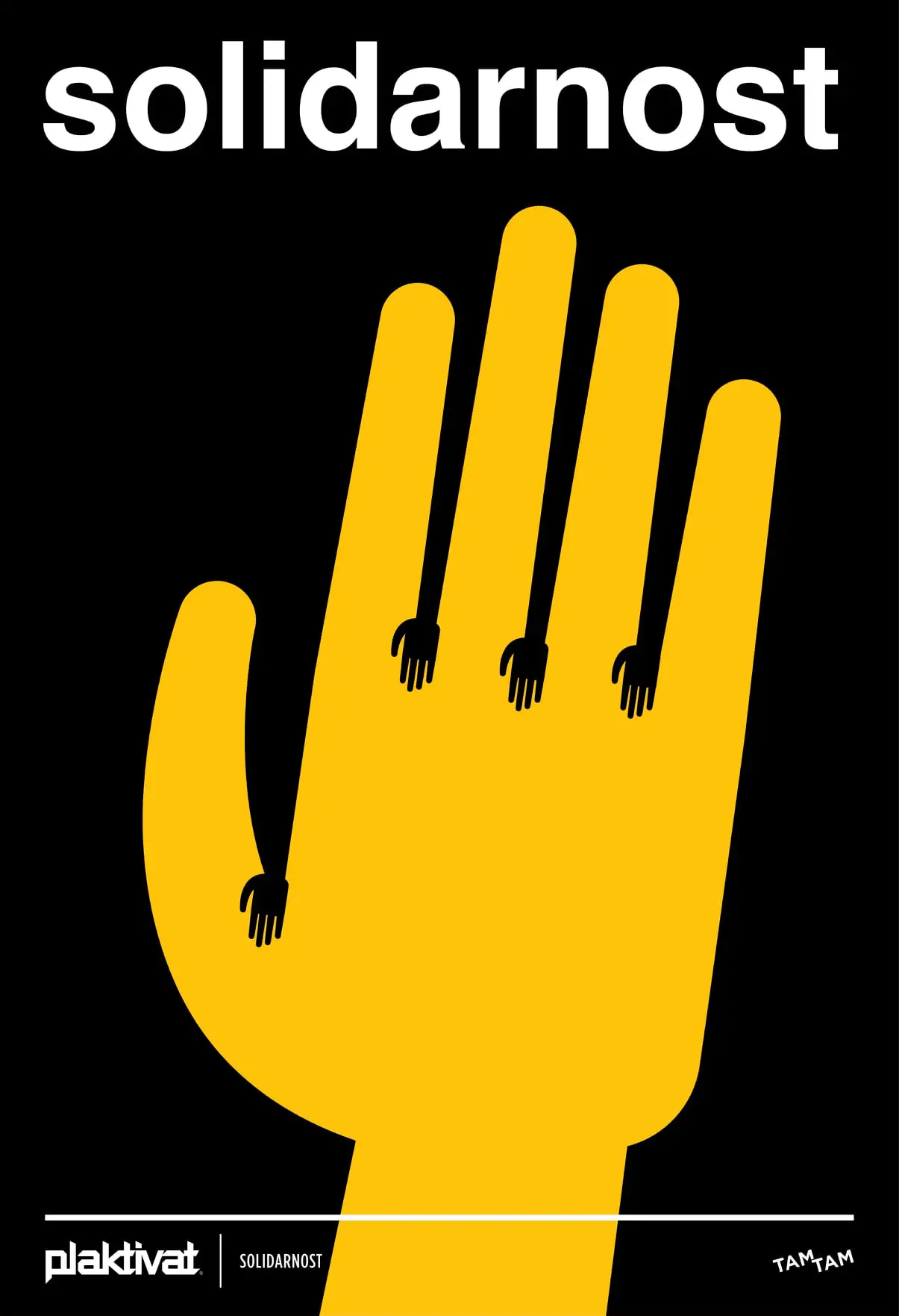
Design: Nenad S. Lazić, Serbia
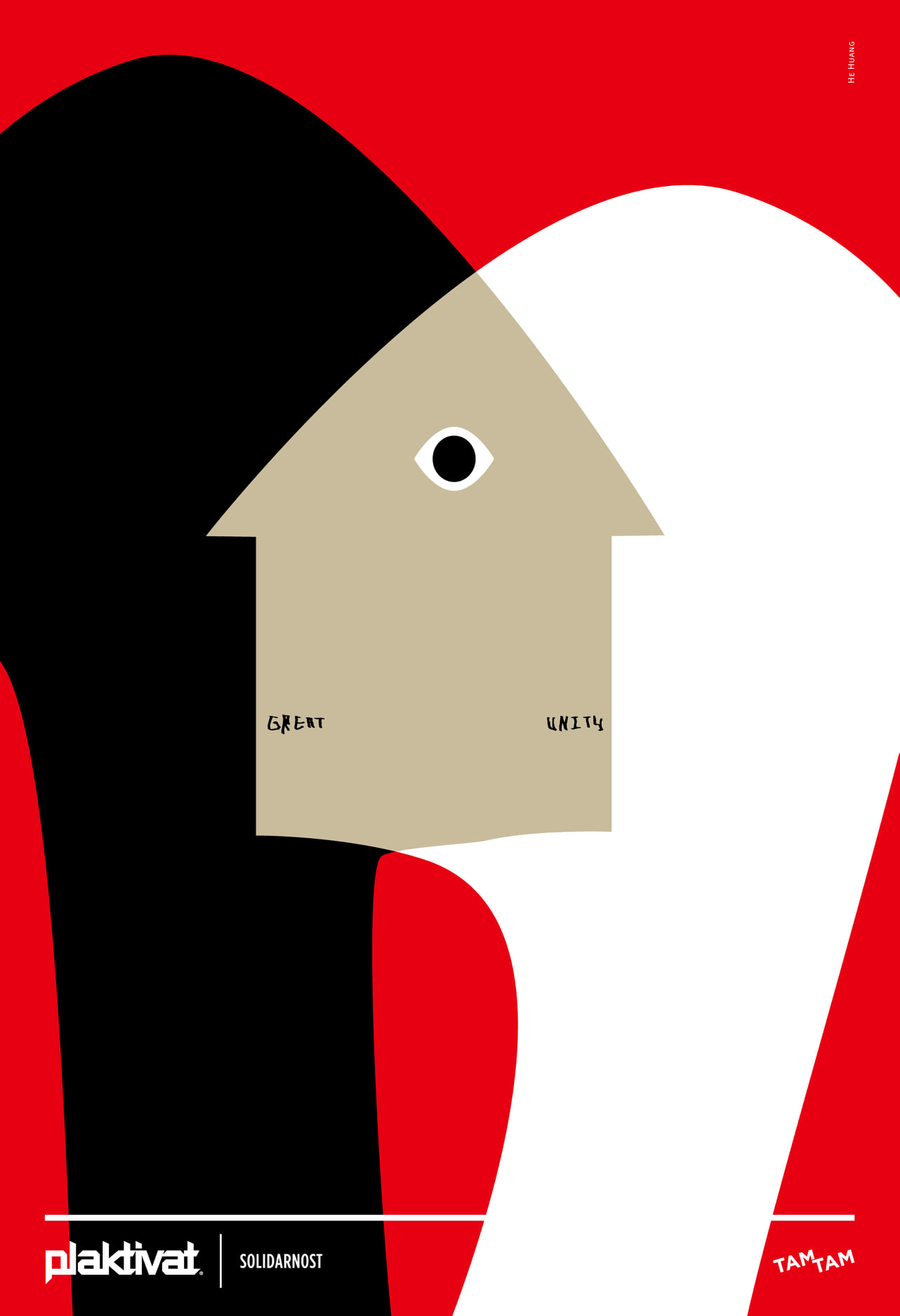
Design: He Huang, China
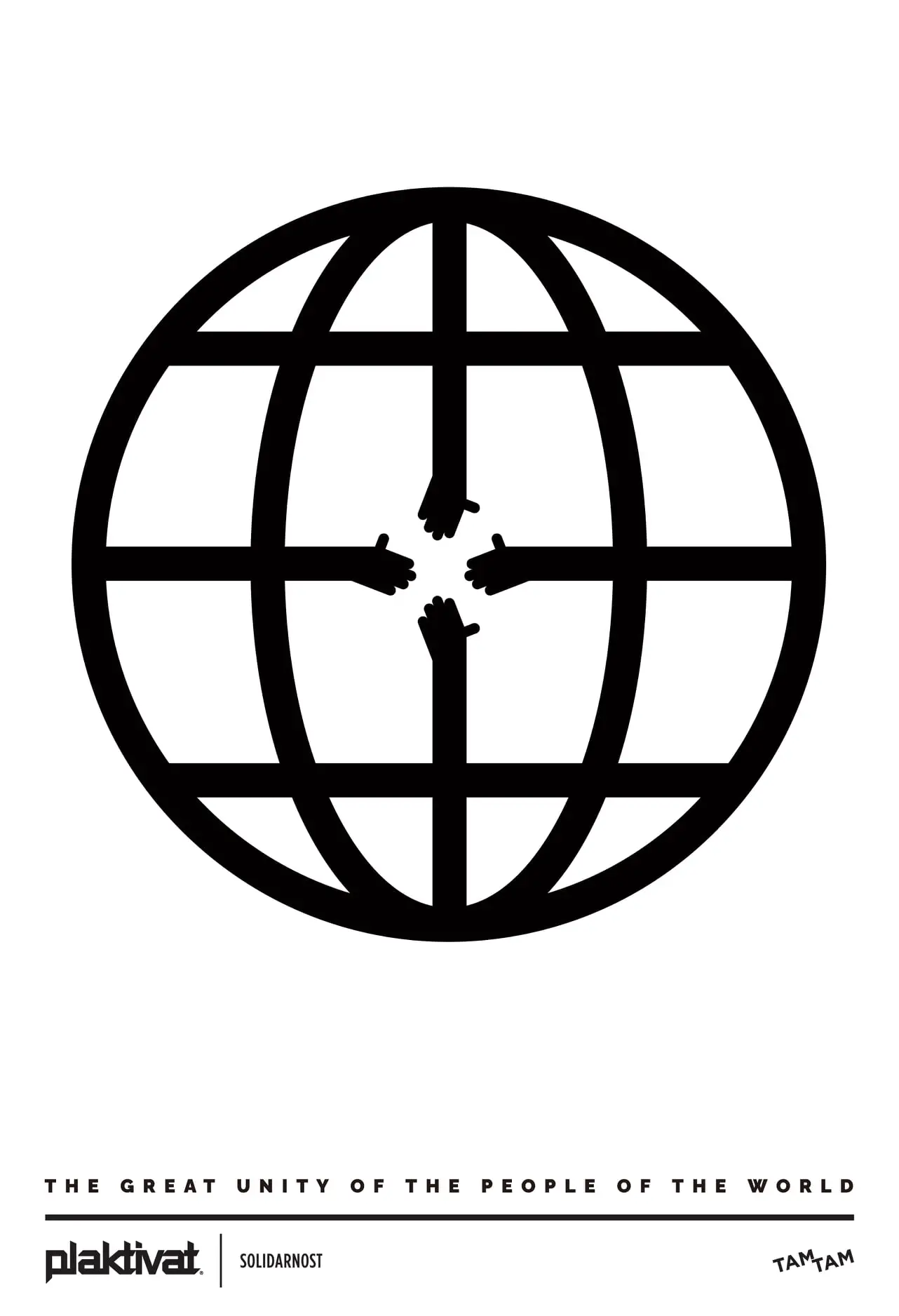
Design: Yuanchao Wang, China
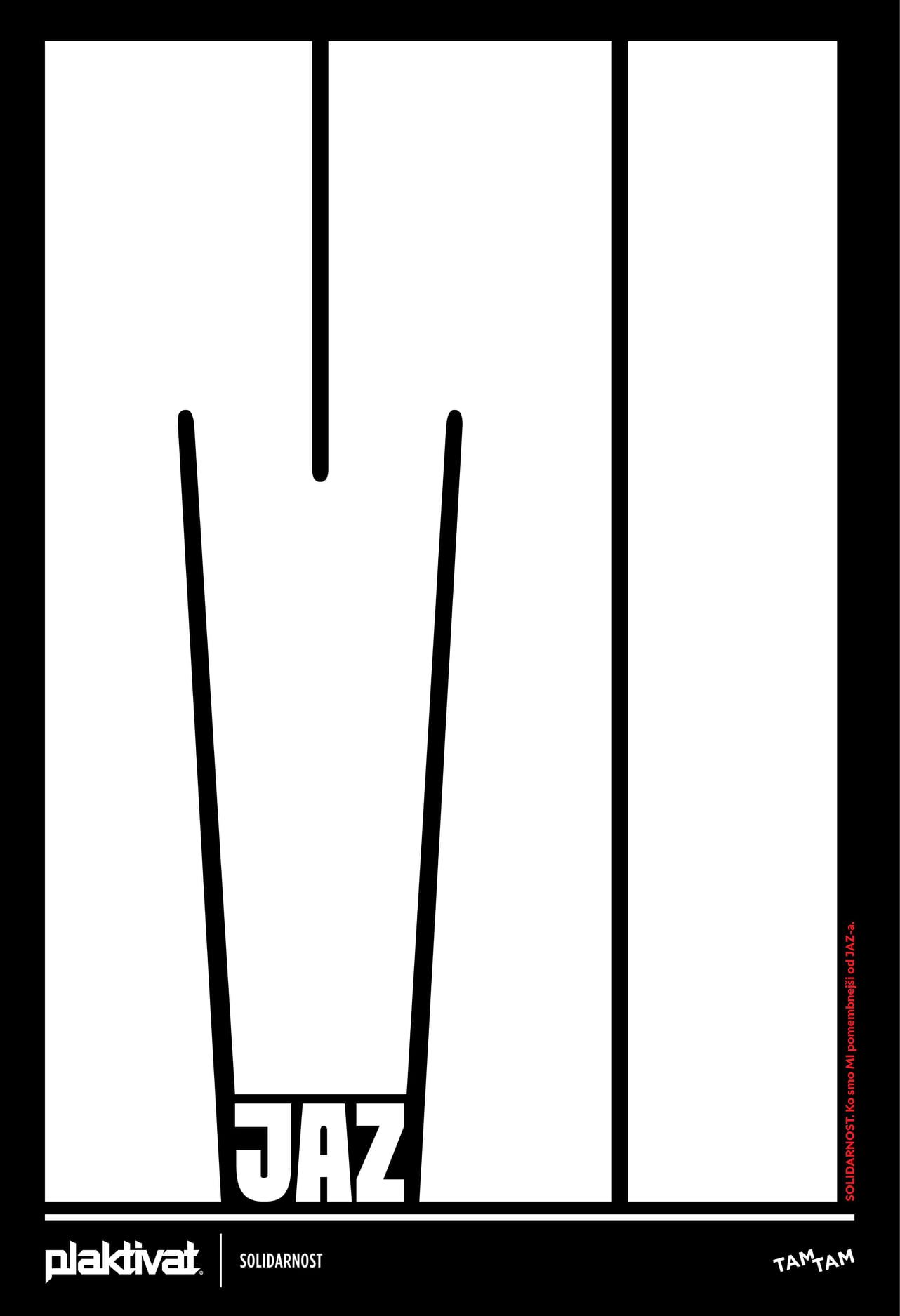
Design: Alja Herlah, of Type Salon, Slovenia
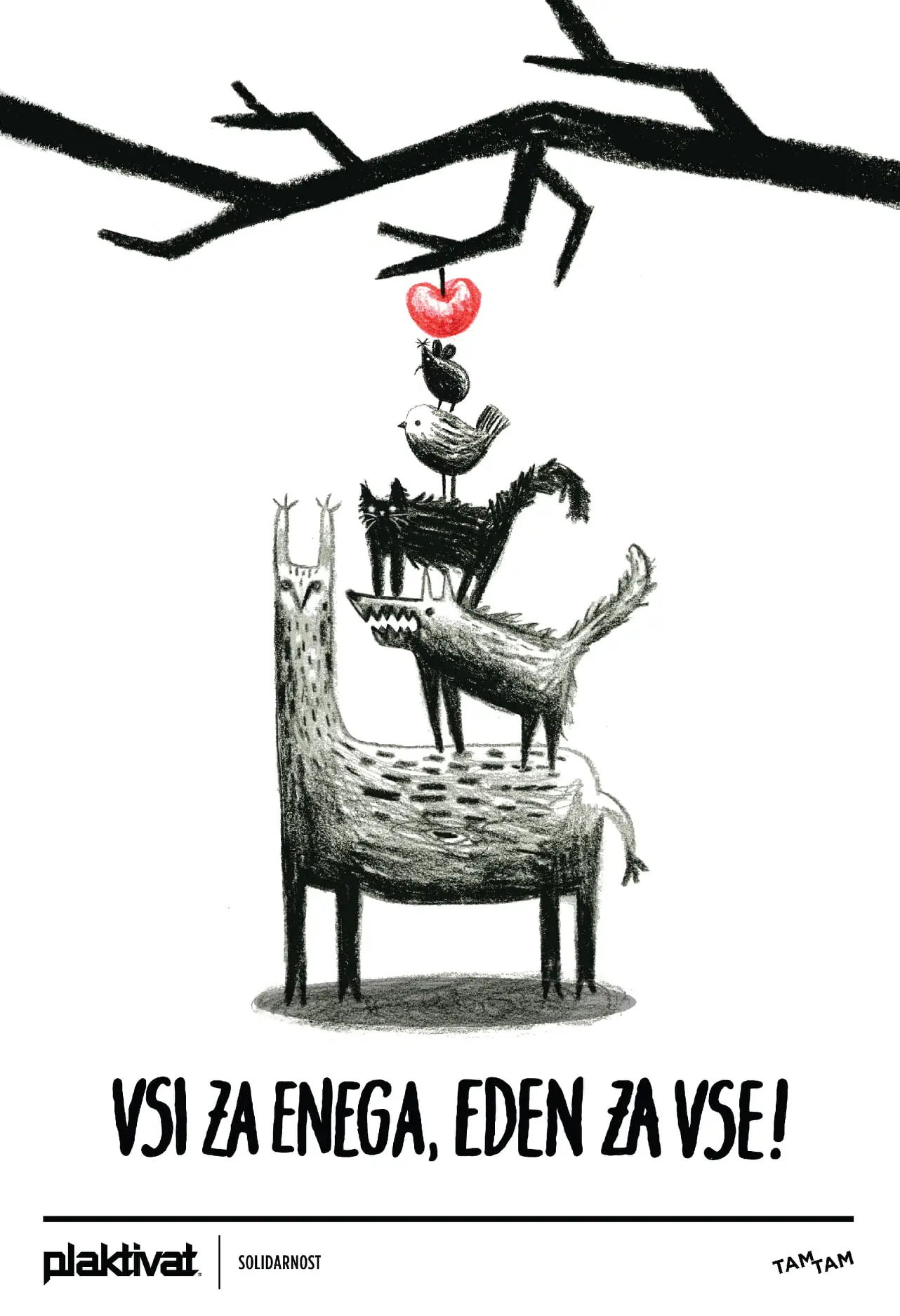
Design: Metka Knap, Slovenia
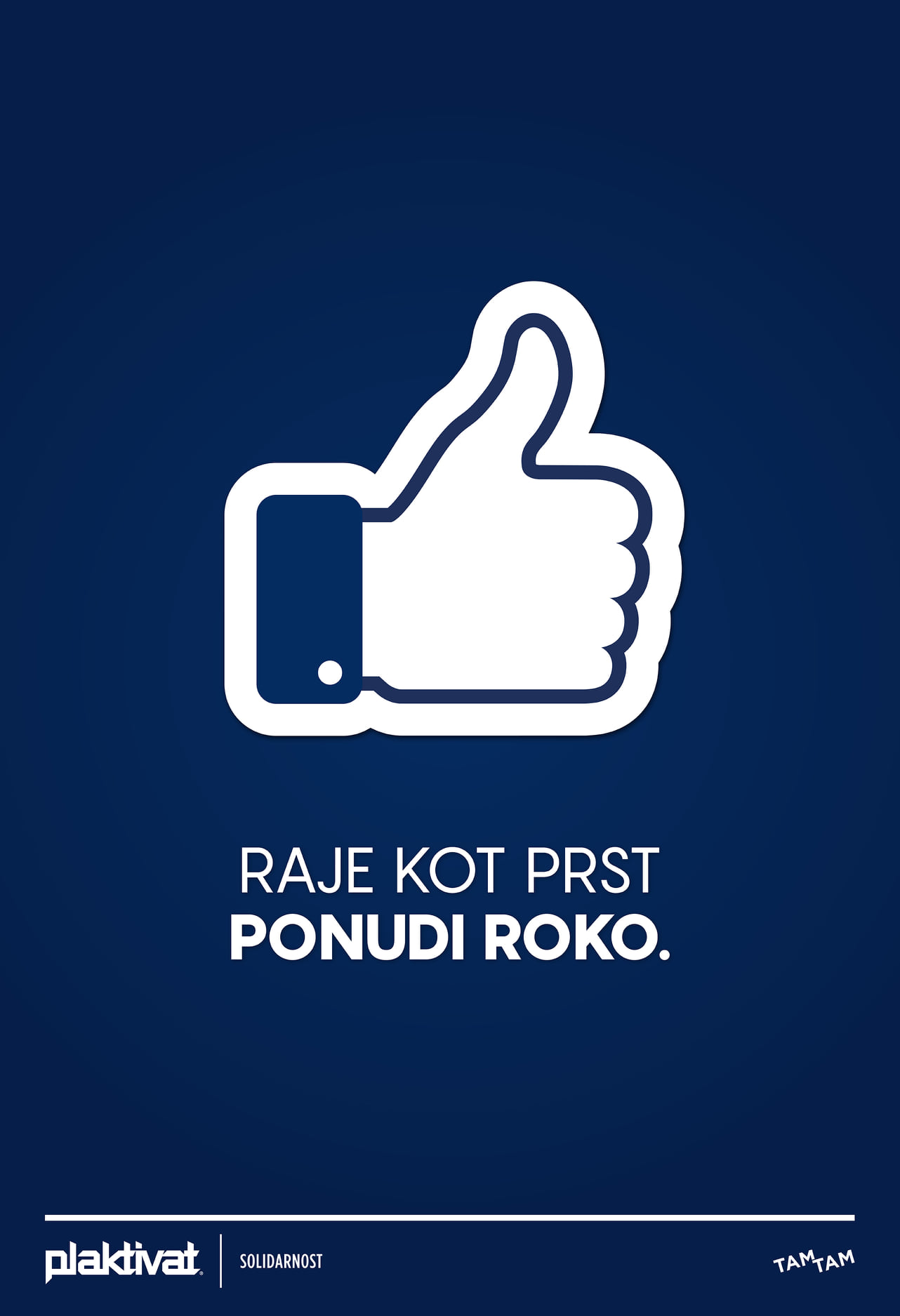
Design: Lara Oset and Eva Gjörek, of Agencija 101, Slovenia
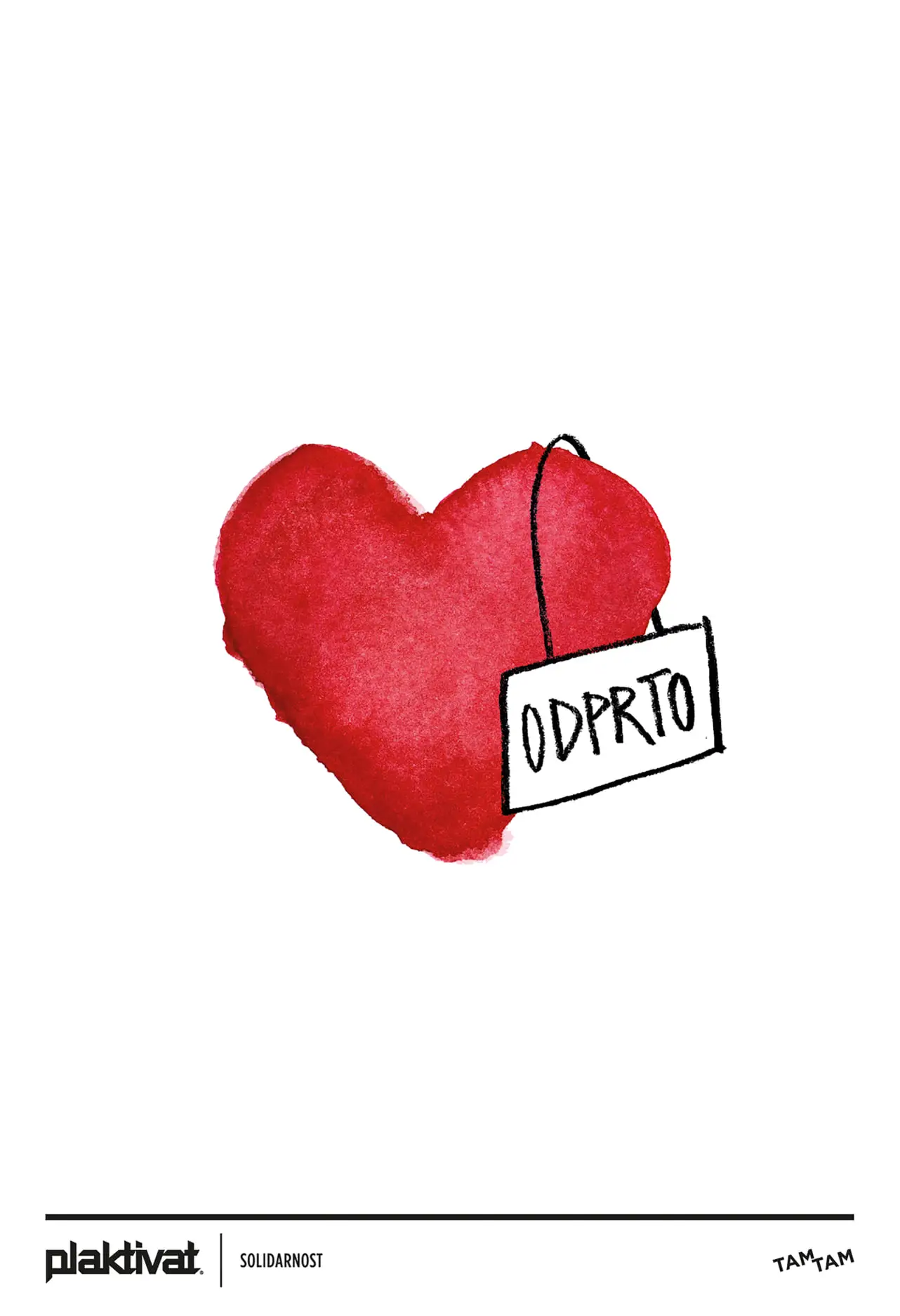
Design: Katrin Bittnerová, Czech Republic
STA, 17 March 2021 - Murder or attempted murder charges more than doubled in Slovenia in 2020 compared to 2019. Last year marked the first time the country saw three triple murders in a single year, all of them being domestic homicides. The trend appears to be continuing this year.
The police processed 16 cases of murders and 29 cases of attempted murder last year, which makes 2020 one of the worst years in this respect in Slovenia's recent history.
In the first months of 2021 the trend has continued: until 15 March, seven murders or murder attempts were recorded.
Underlining the gravity of the trend, the figures do not include the most recent three cases, for which charges have not yet been brought. Nor do they encompass cases - resulting in at least two deaths - where the perpetrator committed suicide afterwards and there were no charges.
Moreover, the statistics are only a reflection of the number of such offences and not the total number of murder or murder-suicide deaths.
Most of these cases are domestic homicides, including intimate partner murders that are often escalations of a domestic violence situation.
The most recent murder-suicide case, which took place near the town of Šmarje pri Jelšah on Monday, suggests such an escalation, with police saying that the most likely motive for the killing was a years-long conflict between the male perpetrator and the female victim.
The Ljubljana Social Work Centre has recorded 680 reports of domestic violence so far this year. In 125 cases restraining orders have been issued and in 43 cases the victim or victims have been moved to a safe house.
The actual prevalence of domestic violence is much greater though, says the centre, noting that such a type of violence, particularly intimate partner violence, is often a hidden problem, swept under the rug due to the stigma surrounding it.
As a result it is difficult to identify, report or prevent domestic violence. Victims often need a lot of expert-based support to speak out, the centre officials says.
Since the start of the epidemic, the centre has not recorded any rise in such reports, warning this does not automatically translate into a lull in such cases. Due to Covid restrictions as people spend more time at home, the victims might find it harder to seek help now that the perpetrators are more present.
Social work centres around Slovenia advocate a zero tolerance policy on domestic violence, warning that despite promising trends in recent years the level of tolerance is still too high.
In most cases the victims are women, however children's safety and health is also at stake and they come first when processing such cases. The experts highlight that living in a domestic violence environment is enough to deem a child a victim of it.
Any type of violence should be reported, the Ljubljana centre says, adding that there are various support platforms for victims. It says any threats by the perpetrators or victims' fears are being taken seriously.
STA, 15 March 2021 - Criminal complaints have been filed against eight persons and two legal entities as part of an investigation of alleged trafficking in human beings or abuse of prostitution in a night club in Šentilj. The scheme involved at least 38 women victims and is believed to have fetched the criminal gang at least EUR 207,000.
The investigation culminated last Wednesday with house searches carried out at 13 locations, with criminal police officers identifying at least 38 victims, mostly from the Dominican Republic.
Criminal complaints have been filed against two legal entities and eight persons, one of whom is still in detention.
The suspected criminal acts in the night club on the border with Austria near Maribor are believed to had been taking place for several years, Beno Meglič, head of the criminal police of the Maribor Police Department, told the press on Monday.
The police have found out using covert methods that the scheme was performed by a criminal gang in which every member had very specific roles.
"The gang was headed by a 40-year-old Slovenian citizen who, together with his wife, a 35-year-old citizen of the Dominican Republic, ran the night club," Meglič said. The club was leased from a 63-year-old Slovenian citizen.
The gang recruited at least 38 women, mostly form the Dominican Republic, but also from Serbia, Romania, Paraguay, Croatia, Venezuela, Colombia, Ukraine and Slovenia.
According to Meglič, the suspects took advantage of the socio-economic situation of the women in their native countries as a recruitment tool.
Some of them were lured to Slovenia under the pretence of a well-paid waitress job, and they were accommodated at various locations in and around Maribor. From there they were taken to the night club, where they had to provide sex services.
The scheme did not stop even during the Covid-19 lockdown, which according to Meglič "shows how utterly careless and irresponsible attitude the gang had towards the victims and visitors, and to public safety and health in general".
The price of sexual services was set in advance at EUR 140 per hour, with the women receiving only part of the payment, as they first had to give most of the money to the gang as reimbursement of costs of transfer to Slovenia.
"Only when they repaid this debt, they started getting their share. They were able to stop doing prostitution only when the gang allowed it or when they managed to recruit, under the pretence of a well-paid waitress job, at least two other women who would then had to do prostitution themselves," he added.
The victims, aged 25-35, were under constant surveillance and some of them formally married Slovenian citizens in order to get residence permits. The first estimates say that the criminal gang has earned at least EUR 207,000 with the scheme.
Under the Slovenian criminal code, between three and 15 years in prison and a fine is envisaged for a criminal act of trafficking in human beings as part of a criminal gang.
Meglič added that criminal police officers were also looking into suspected criminal act of money laundering committed by the mentioned 40-year-old and the 63-year-old Slovenian citizens.
According to the newspaper Večer, the suspects include Zlatko Župec, the person who leased the Tropicana night club, and its owner Bojan Belna, who is a member of the Šentilj municipal council from the Democratic Party (SDS).
Meglič did not mention any specific names today for the sake of protection of personal information. "I may confirm that no political party was subject of investigation in these preliminary proceedings," he added.
STA, 15 March 2021 - Slovenia awarded citizenship to 1,900 foreigners residing in the country in 2019, which is a 5% drop in comparison to the year before, show statistics published by Eurostat on Monday.
While Slovenia recorded a 5% drop, an increase of the same percentage was recorded in the EU overall, shows the data that excludes the United Kingdom.
A total of 706,400 people were awarded citizenship by EU member states in 2019, with Germany leading the way with 132,000 citizenships or 19% of all.
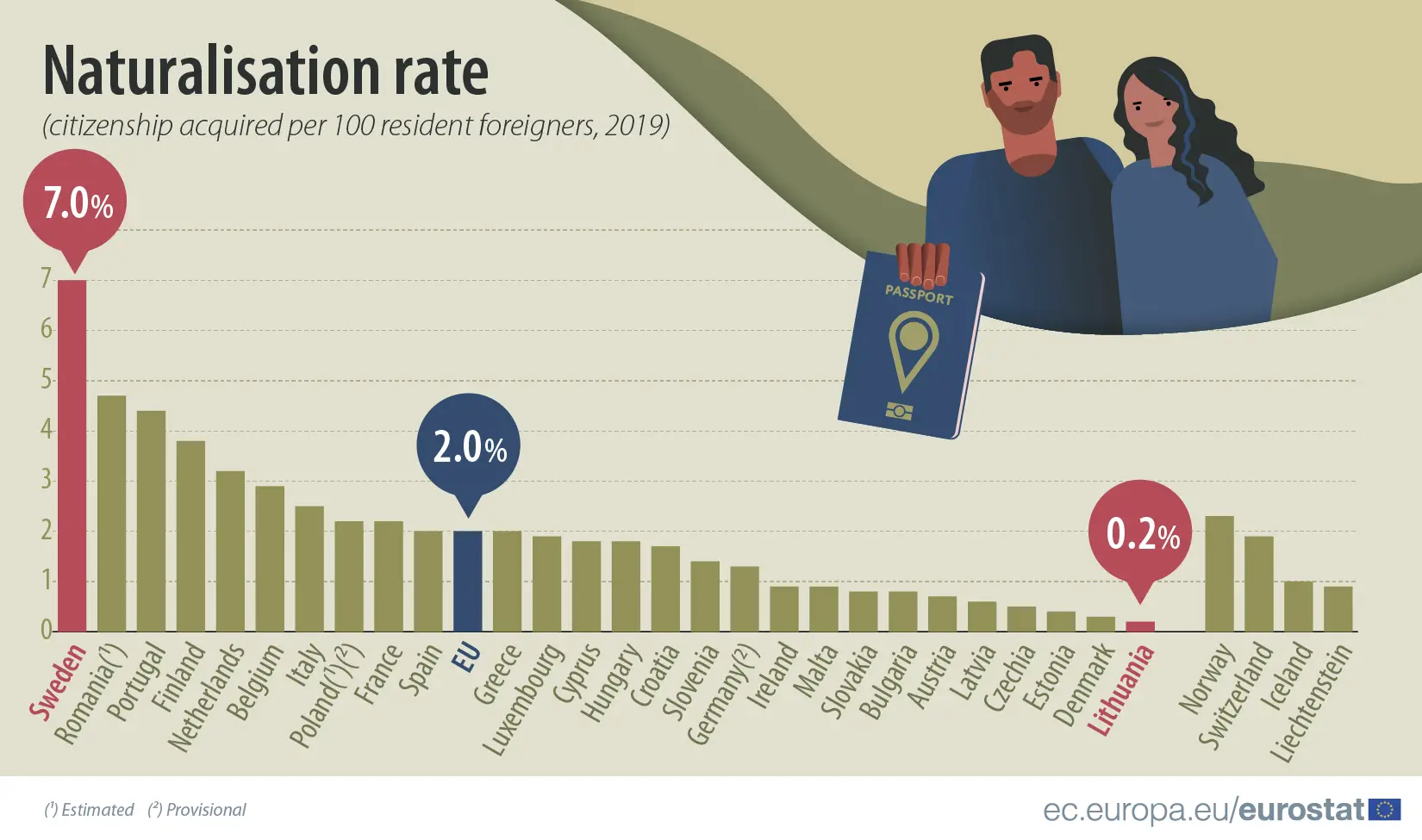
Non-EU citizens accounted for 85% of those who were granted citizenship by an EU member state in 2019. In Slovenia, this share was much higher, at 95.7%.
Luxembourg and Hungary were the only EU member states to award more citizenships to citizens of fellow EU members than to non-EU citizens.
The share of women overall was 51.7%, with Slovenia being one of the eight EU member states to award more citizenships to men (59.7%), trailing only Romania (63.9%).
Half of those who were granted a citizenship of an EU member state in 2019 were younger than 32. In Slovenia, the median was just below 29 years of age. Around a third of these persons in Slovenia were children younger than 14.
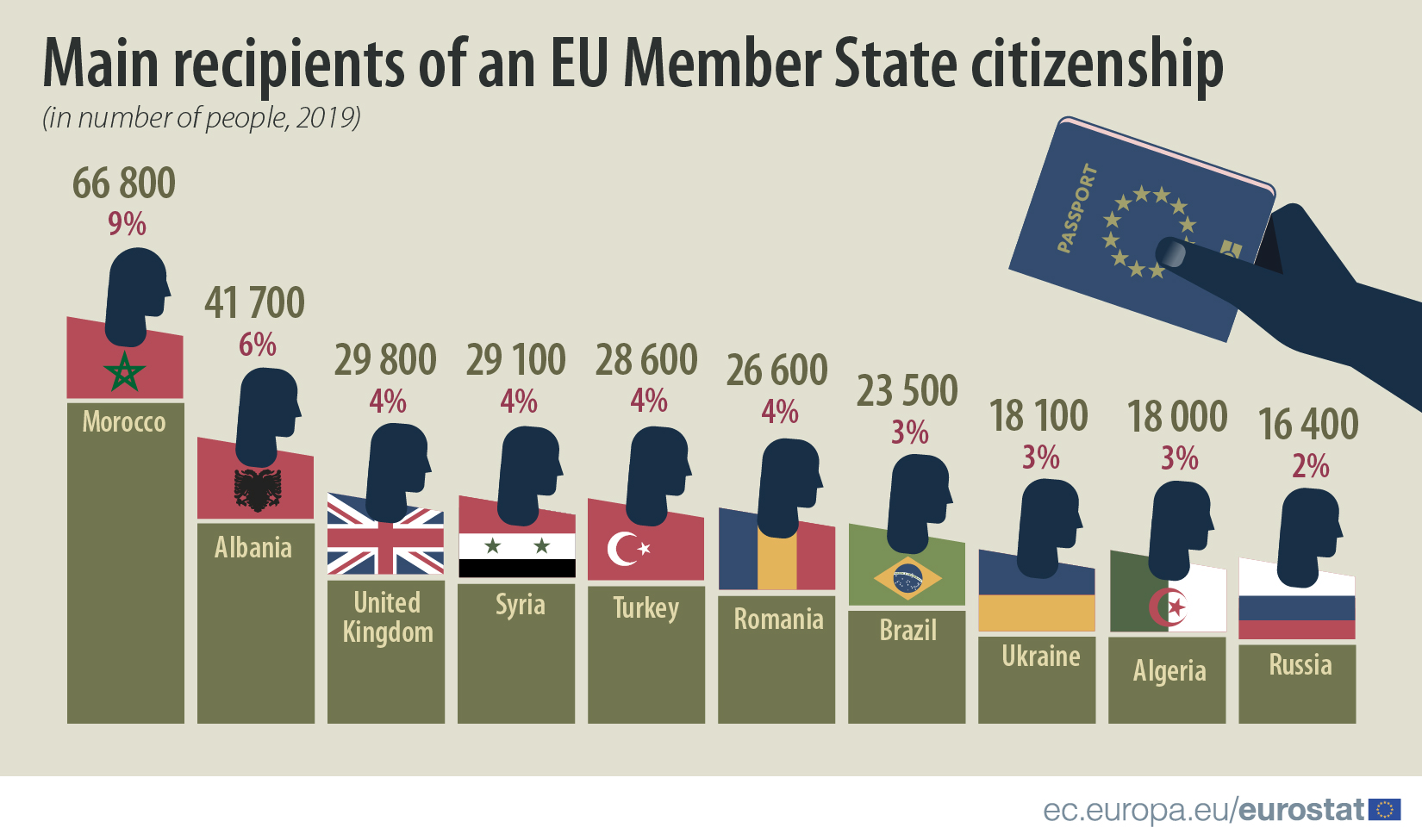
All the data can be found here





